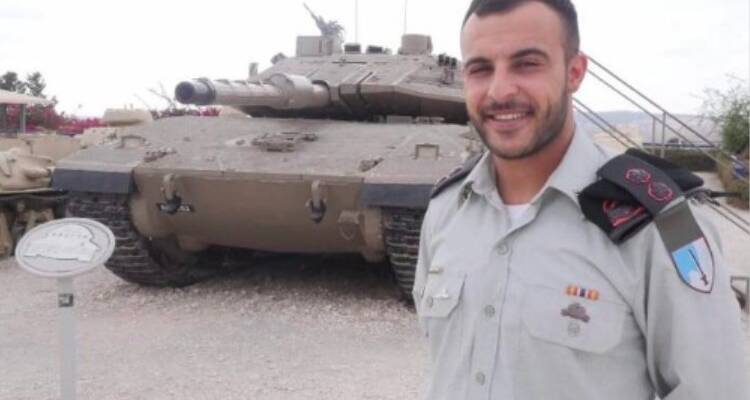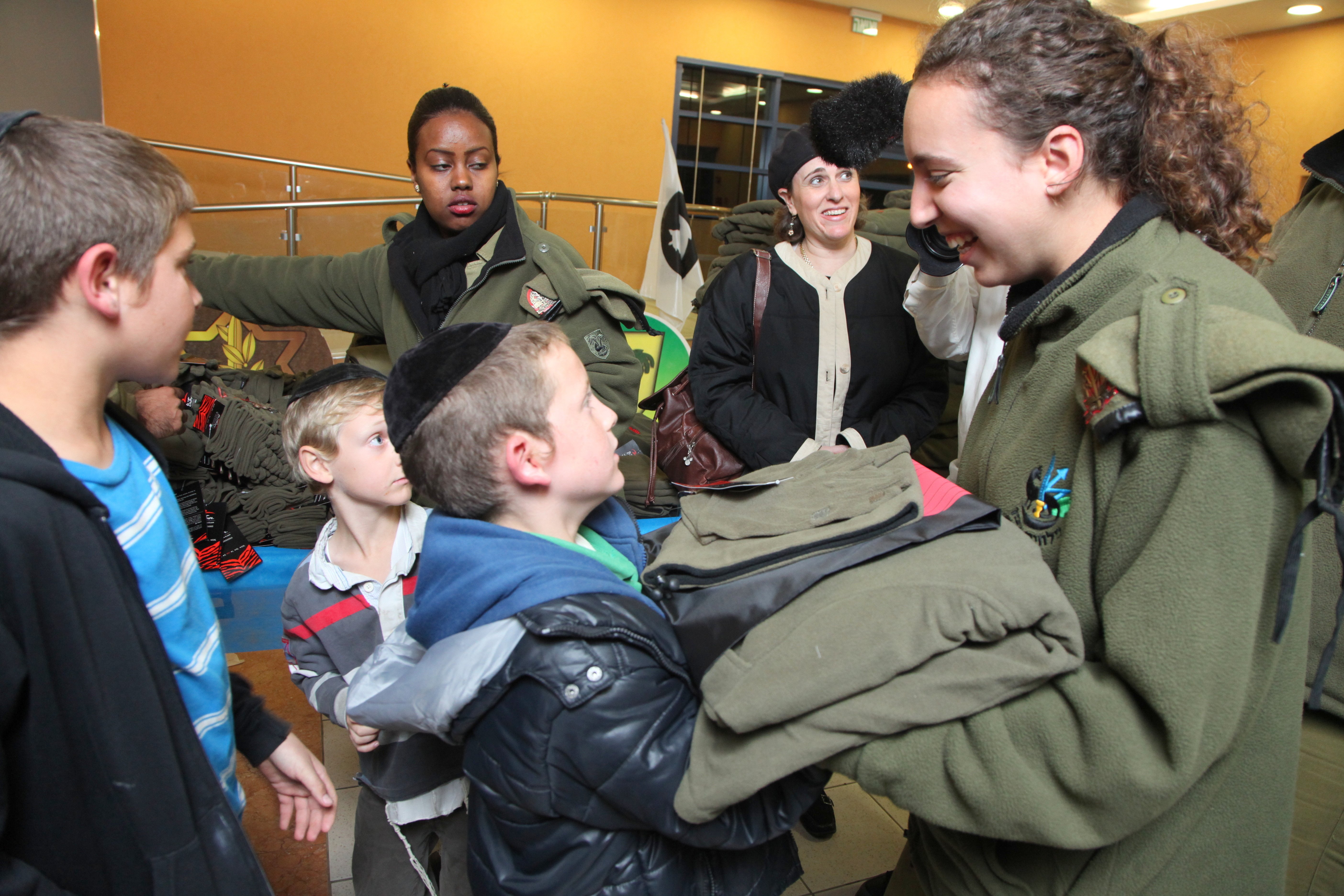‘He told me not to worry, but I knew he would be the first to run to the battle.’
By Hila Alpert, JNS
Salman Habaka was in 7th grade when he came home from school one day crying because he got a 99 on his Hebrew exam instead of a perfect grade as he was used to. “That’s it, I don’t have a father anymore because he unfairly took off a point on my test,” he told his mother.
“He was competitive, especially with two other girls in the class who would often check his tests to make sure his teacher father didn’t miss a mistake,” said Habaka’s mother, Mohaveb, her eyes sparkling for a moment.
Laughter had also sparkled in the eyes of Salman, the eldest of four sons and two daughters born to her and Imad, who, until a year ago, worked as a Hebrew teacher and insisted on teaching his children. He swore he did not alter their grades but treated them the same way he treated all his students. Imad simply wanted to make sure his children got the best education possible.
From the balcony of the house in the Western Galilee Druze village of Yanuh-Jat, one can see Lebanon; the coastal Acre area, where Salman studied at the Naval Officers’ School, is hidden behind the hills.
The family’s living room is full of mementos brought by those who came to offer comfort after Salman was killed in action. There are photographs, paintings and candles bearing the portrait of the revered commander, who, at age 31, was promoted to the rank of lieutenant colonel, commander of the 188th Armored Brigade’s 53rd “Tempest” Battalion. Salman, 33 at the time of his death, showed extraordinary abilities at a young age.
In one photo, Salman is seen with his wife, Arin, whom he married four years earlier, holding Imad, his two-year-old son, whom they named after the grandfather according to Druze tradition. When little Imad was born, Salman was working on his master’s degree in Middle Eastern studies and would come home almost every evening. Later came the promotion, after which he would only come home once every two weeks. Then came the war, from which Salman did not return.
Salman was killed in the Gaza Strip on Nov. 2.
In the media and at the funeral Salman’s memory was wrapped in words of praise and heroism.
“How have the mighty fallen,” said Minister-without-Portfolio Gideon Sa’ar, representing the government at the funeral. “I came to pay my respects to one of the great heroes of the Israel Defense Forces, of the State of Israel. Many Israeli citizens owe their lives to Salman Habaka. He fell in a complex battle against dozens of terrorists. In the battle in which he fell, he again showed personal bravery. The IDF has many achievements, but unfortunately, we are also paying a heavy price in loss of life. Lt. Col. Salman Habaka, I salute you,” he said.
Always a leader
“Salman was always the first. It was always ‘Follow me,’” said Salman’s father Imad. “You can’t expect your subordinates to exhibit heroism unless you yourself are a hero. To serve as an example. He understood that and always acted that way.
“He was always a leader. Very pleasant, but the one who leads others. When people came to mourn with us, there was a group of students who studied with him at the Naval Officers’ School in Acre, and they couldn’t stop talking about him.
“That visit moved me the most. They remembered him in great detail, how he helped everyone with their homework without asking for anything in return. We were also visited by the parents of a soldier who got into debt due to gambling, and they shared how Salman helped him get out of that mud.
“We were told that as battalion commander he would go around the base and talk to his soldiers—this is 400 fighters we’re talking about. He was interested in each one and would always be there for them if there were any problems. A true commander.”
I ask Mohaveb whether she ever tried to dissuade Salman from a military career.
“Not at all,” she answers, surprised by my question. “We have no choice but to defend our homeland. Who will protect us? Who will give us life if not the soldiers?!”
Mohaveb says she believes God is in charge and that it didn’t matter whether Salman was in Gaza or running an errand at the time of his death. “That was his day, his destiny, and nothing could change it,” she said.
When asked whether the Druze belief in reincarnation offers some kind of comfort, Imad answers, “By and large, yes. You are born again, and a family is waiting for Salman now and they are happy to have a son. We just have to pray that this is a good family that is affectionate and knows how to raise a child.”
Imad adds that Druze believe that only those who fell in battle remember fragments of their previous life after reincarnation.
The funeral, the likes of which the village had never seen, was led by the Druze spiritual leader in Israel, Sheikh Mowafaq Tarif, who said that the leaders of Israel “must today bow their heads before Salman, before his friends and before the thousands of Druze soldiers who were called up to fight the war. They must wake up from their coma, apologize to the congregation, and bring about a real, substantial and tangible change. We are partners not only in war but also in times of peace that we all wish for.”
According to Imad, the connection between the state and the Druze community is strong despite the challenges, such as the so-called Kaminitz Law that enables the state to destroy illegal buildings despite the difficulty of obtaining building permits in Arab and Druze towns.
A hero of Israel
“I want Salman to be remembered as a hero of Israel, and it doesn’t matter if he is Muslim, Druze, Jewish, or Christian,” said Imad.
On Oct. 7, when Hamas attacked Israeli communities near the Gaza Strip, Salman was at home. The family had planned to go to the Golan Heights to celebrate Mohaveb’s birthday, but then Salman had to leave to join the battle. He did not leave Kibbutz Be’eri for four days, when the fighting there was over.
When Salman finally telephoned, he apologized for not contacting his mother on Oct. 7 to wish her a happy birthday. And Mohaveb, who had a feeling from the very beginning that something bad was going to happen, said she did not want birthday wishes, but only for Salman to be back home.
“He felt my worry. He told me not to worry, but I knew he would be the first to run to the battle,” she lamented.
Keep Israeli Soldiers Warm this Winter - Send Warm Jackets!
We are honored to thank the young men and women of the IDF who risk their lives every day to defend the citizens of Israel.
Join us in sending winter care packages and personal notes of support to Israeli soldiers who are out in the cold all day.
Warm up a soldier's heart with essential winter wear including fleece jackets, hats, gloves and more. Keep an entire unit warm!
THE SOLDIERS REALLY APPRECIATE YOUR LOVE AND CONCERN!



